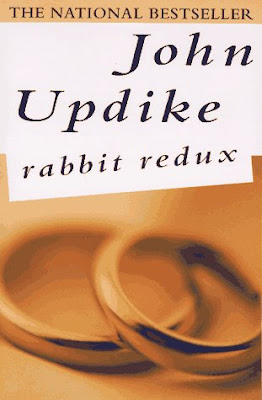
I only added the 1969 John Wayne film True Grit to my Netflix queue after I read that the Coen Brothers agreed to film a remake. Even without seeing the movie, I wondered at the decision: I mean, who could possibly play John Wayne?
In True Grit, Wayne is playing the John Wayne character, this time under the guise of one-eyed fat man U.S. Marshal Rooster J. Cogburn, a truly great character name. Cogburn is approaced by a young girl who wants him to go after the man who killed her father, but she insists on going on the dangerous journey with him. They are also joined by a quarrelsome Texas Ranger. The three travel through Indian territory until the climactic confrontation with the gang shielding the murderer.
The role of Rooster Cogburn garnered Wayne one of the most blatant "career achievement" Oscars in history, right up there with Paul Newman's For The Color of Money and Scorsese's Best Director for The Departed. This is not to denigrate Wayne's performance, and certainly not his career. Wayne is oddly and unfairly denigrated as an actor because of his penchant for playing similar characters, but he created and perfected this type in some great movies, which have entertained millions, and would likely impress even the biggest critics of the Western genre if they just gave him a chance. Here Wayne is appropriately ornery, compelling and likable despite his favoring violence and a shoot-first philosophy.
The supporting cast in True Grit is an odd assemblage of young actors and non-actors, some who demonstrated the talent which would make them famous, and some who showed why they weren't ever in movie roles before. Robert Duvall and Dennis Hopper show up in supporting roles as outlaws, and Duvall especially shines as Lucky Ned Pepper, leader of a gang of thoughtlessly evil ruffians.
The other two-thirds of the posse are problematic. Kim Darby plays the girl, and she plays the part as written, stuffy, uncontrollable, and determined. This she does well. Her dialogue however, is painful at times, Runyonesque in its lack of contractions, overly cute in its pretensions, as the screenwriter was to bored to make her a realistic character. Country singer Glen Campbell plays the Texas Ranger, and as an actor, well, at least he had that singing thing to fall back on. Campbell is probably not as bad as many people on the imdb boards say he is, it's not like he is distracting, but the choice to cast him in the role is indefensible. Apparently it was a decision made purely out of synergy, the studio wanted Campbell to have a hit with the song "True Grit" and get Campbell fans into the theaters. Campbell's dialogue is also poorly written, but unlike Darby, his delivery does nothing to help it fit into the film better.
While the dialogue occasionally fails the story is taut and well-structured, imperiling out heroes enough to make the required happy ending feel less cliche than in many Westerns. Wayne shows abundant star quality and makes the case that even if this wasn't the role for it, he still deserved an Oscar. The movie gets 7.4 out of 10.
After watching True Grit, I still can not imagine how the Coens are going to do this. The only real possibility I can see is Eastwood as Cogburn, and I know that's not going to happen. Thinking of people who have been in other Coen films, I really hope they don't give it to Tommy Lee Jones or Josh Brolin. Robert Duvall could possibly pull it off, he seems grizzled enough, but on the whole I think I'd rather they just skip it and make the movie adaptation of Yiddish Policeman's Union like they were supposed to.
Next? Probably Patton, unless I get to the theaters to see I Love You, Man first.















